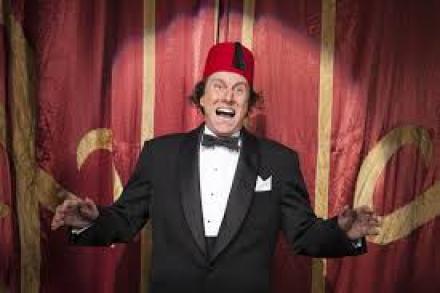
Cooper and drink seemed to go hand in hand. He was not known publicly as a drunk, and it was not part of his stage persona. Yet looking back it is remarkable to see how often he used to refer to drink both in his act and in interviews. It was almost a cry for help, as he told interviewers, ‘I never drink before a show. If I did my tricks might start to go right.’ He did a very neat trick of making a small whiskey glass disappear into thin air by slamming one hand down on the other. And then there was another classic Cooper line: ‘Sometimes I drink my whiskey neat. Sometimes I take my tie off and leave my shirt hanging out.’
Then there was the gag about being stopped by the police. ‘I was driving home the other week and a policeman stopped me. He said, “Is this car licensed?” I said, “Yes constable. Would you like a gin and tonic ?”’ This may have been partly inspired by a real event. In the late 50s Cooper was stopped by the police and was set to face charges until he agreed to do a gig for a police charity instead.
By the mid-70s, however, Cooper’s star had risen and was falling again. It was not his talent that was at fault but his health. Those years of smoky late nights had taken their toll – his own habit of smoking up to forty cigars a day didn’t help – but more importantly he was drinking heavily. There were recordings when he had to have cup after cup of black coffee before dress rehearsals and recordings so that he could be coherent. According to John Fisher, in 1978’s Cooper – Just Like That TV show he missed cues, turned his back on the audience, argued with a fan and at the end of one edition could be heard muttering ‘rubbish’ as the credits rolled. It was assumed to be a joke but maybe he was aware of how shambolic he was getting. It was a shame that his own joke was not coming true – having a drink before a show didn’t make the tricks go right, it made the comedy go wrong.
His punctuality was getting worse too. He arrived onstage late, sometimes didn’t have the right props with him and was not firing on all cylinders. One could sometimes hear the clink of bottles in his bags as he arrived. Like a magic trick anything might emerge from Cooper’s plastic bags as long as it had an alcoholic element to it – green Chartreuse, yellow advocaat, vodka, gin, brandy or whiskey. He once asked for gin at breakfast in a hotel and poured it on his cornflakes, saying it was healthier than fatty milk. When he did drink milk it was to line his stomach before another binge.
The drinking took a toll on his domestic life. Gwen was also fond of a drink, and rows between them could become heated and even violent. By the end of the 60s Gwen had been in touch with Miff  Ferrie, saying they were going to get a divorce. The marriage rumbled on however. When Cooper had a heart attack in Rome in 1977 which might have killed lesser men, the doctors had an easy, brutal explanation: chronic alcoholism was cited as a cause. It was a scare but it didn’t stop him. He was clearly in denial, constantly trying to make light of his drinking. He once told producer Dennis Kirkland he was only allowed one glass of Dubonnet. When it was pointed out to him after a liquid lunch that three bottles had been consumed, he argued, ‘I’ve only used one glass.’ Legend has it that his meanness and his alcoholism collided backstage – he would lock his booze away so that no one else could get at it. He would even lock the phone away so no one could make phone calls which would appear on his bill. During fights at home crockery was smashed and furniture thrown. Dove tried to find the funny side when she talked to the press, explaining that was why they did not have any matching chairs. It was not easy living with Cooper: ‘He was the nicest, kindest and most awkward man in the world’ she said.
Ferrie, saying they were going to get a divorce. The marriage rumbled on however. When Cooper had a heart attack in Rome in 1977 which might have killed lesser men, the doctors had an easy, brutal explanation: chronic alcoholism was cited as a cause. It was a scare but it didn’t stop him. He was clearly in denial, constantly trying to make light of his drinking. He once told producer Dennis Kirkland he was only allowed one glass of Dubonnet. When it was pointed out to him after a liquid lunch that three bottles had been consumed, he argued, ‘I’ve only used one glass.’ Legend has it that his meanness and his alcoholism collided backstage – he would lock his booze away so that no one else could get at it. He would even lock the phone away so no one could make phone calls which would appear on his bill. During fights at home crockery was smashed and furniture thrown. Dove tried to find the funny side when she talked to the press, explaining that was why they did not have any matching chairs. It was not easy living with Cooper: ‘He was the nicest, kindest and most awkward man in the world’ she said.
This could not last for ever. By the 1980s Cooper’s star had declined and he had some odd bookings. He even supported The Police – the band, not officers who wanted to nick him – but he was still a big enough name to be a guest on ITV’s prime-time variety show Live From Her Majesty’s in April 1984. As he proceeded to do his act, pretending to pull increasingly odd items from under his cloak (in reality Jimmy Tarbuck was passing them through the curtain), he suffered a heart attack, crumpled and fell. It seemed like another trick, but soon it was clear there was something wrong, and for the sixteen million viewers at home the programme cut to a commercial break. When it returned the old maxim ‘The show must go on’ really did kick in. Despite Cooper’s large feet still protruding from under the curtain, Jimmy Tarbuck introduced the rest of the show. If Cooper could have chosen a way to die, it might have been something like this.
Cooper’s death was a huge shock to the public. He was only sixty-three but his health had been failing for years. There were leg problems, bronchial problems and heart problems. He knew he had to give up drinking and smoking but struggled. One time in front of Bob Monkhouse he cracked open a can of lager and lit up a panatella. Monkhouse said he thought he had given up. Cooper gestured to the weak alcohol and thin cigar and replied, ‘You can’t call this smoking and you can’t call this drinking, can you?’
Not Like That, Like This is on ITV1, 9pm, Easter Monday. Pictures throughout courtesy of ITV1. Beyond A Joke is now available. Buy here. Read an interview with Jason Manford about working on Not Like That, Like This here.
Pages
- « first
- ‹ previous
- 1
- 2
- 3





